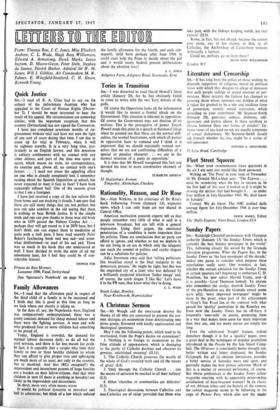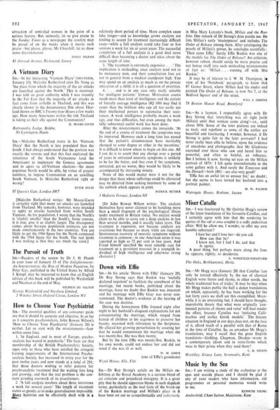Sunday Papers SIR,—Randolph Churchill pronounces with Olympian authority (January 13)
'the Sunday Times, which is certainly the best Sunday newspaper in the world.' This, following closely the award by the Granada television programme, What the Papers Say, to the Sunday Times as 'the best newspaper of the decade,' makes one pause to consider what purpose these superlatives really serve. One wonders, in fact, whether the current adulation for the Sunday Times in certain quarters isn't beginning to embarrass C. D. Hamilton, his new editor Harold Evans, and—if it is possible—Lord Thomson himself. To anyone who remembers the stodgy, donnish Sunday Times of the pre-Hamilton era the Granada award seems quite silly; 'most improved newspaper' might be more to the point, since part of the achievement at Gray's Inn Road lies in the contrast with what passed for 'quality' journalism in the Kemsley era. Even now the Sunday Times has its off-days; it frequently 'over-sells' its stories, presenting them in a way that makes them seem far more important than they are, and too many stories are simply too long.
Even the celebrated 'Insight' feature, radical departure though it is for a 'quality' paper, owes a great deal to the techniques of popular journalism introduced in the People by the late Stuart Camp- bell. The Observer is consistently better thought out, better written and better displayed; the Sunday Telegraph, for all its obvious limitations, provides a better service of Saturday news and sport, and generally makes the best picture selection. Much of this is a matter of personal preference, of course. But whose preferences is the Sunday Times colour magazine courting with its apparently never-ending serialisation of bare-breasted women? In its choice of art, African tribes and the history of the camera, the colour magazine seems to be following in the steps of Picture Post, which also saw the reader attraction of semi-clad women in the guise of a serious feature. But, seriously, let us give praise to the Sunday Times as a newspaper the country may be proud of on the weeks when it merits such praise—but please, please, Mr Churchill, let us show some discrimination.
JANICE INGRAM



































 Previous page
Previous page